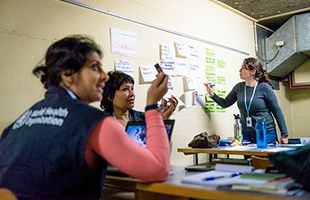
Risk assessment
A risk assessment determines the potential impact of a public health threat and the necessary response measures. Under the International Health Regulations (IHR) provisions, countries detect and notify WHO of any event that may constitute a public health emergency of international concern (PHEIC). Public health risks and events that need to be notified can be any of the following hazards: biological, chemical, or radiation-related, regardless of whether their origin is natural, accidental, or deliberate. Countries’ decisions to notify WHO is informed by the use, at national level, of the decision instrument contained in Annex 2 of the IHR. This instrument is structured around the consideration of the severity of the event; whether the event is unusual or unexpected; the actual or potential for international spread; and the actual or likely application of international-travel or trade restrictions.
Risk assessment is a systematic and continuous process of gathering, evaluating, and documenting information to manage and mitigate the impact of acute public health threats. WHO supports countries to develop, strengthen, and maintain their capacity to conduct risk assessment by providing technical guidance and in-country operational assistance. This support provided is tailored to the specific needs and context of each country.

